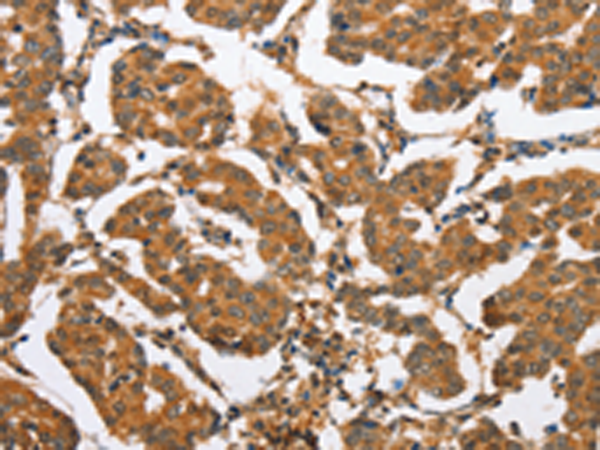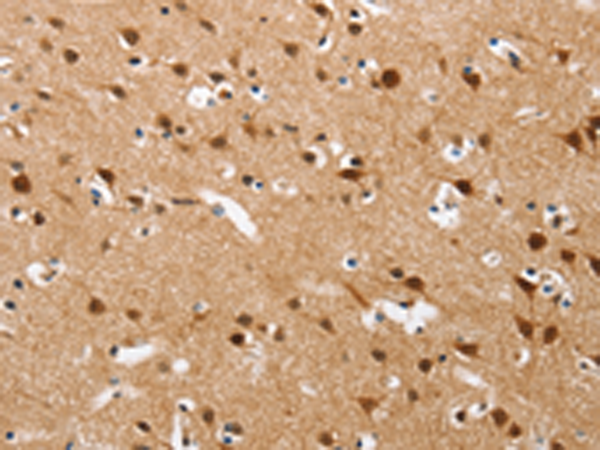

| WB | 咨询技术 | Human,Mouse,Rat |
| IF | 咨询技术 | Human,Mouse,Rat |
| IHC | 1/50-1/200 | Human,Mouse,Rat |
| ICC | 技术咨询 | Human,Mouse,Rat |
| FCM | 咨询技术 | Human,Mouse,Rat |
| Elisa | 1/2000-1/5000 | Human,Mouse,Rat |
| Aliases | KEC; KS1; BMAC; BRAK; NJAC; MIP2G; MIP-2g; SCYB14 |
| Host/Isotype | Rabbit IgG |
| Antibody Type | Primary antibody |
| Storage | Store at 4°C short term. Aliquot and store at -20°C long term. Avoid freeze/thaw cycles. |
| Species Reactivity | Human |
| Immunogen | Fusion protein of human CXCL14 |
| Formulation | Purified antibody in PBS with 0.05% sodium azide and 50% glycerol. |
+ +
以下是关于CXCL14抗体的3篇参考文献摘要:
1. **"CXCL14 inhibits breast cancer metastasis via regulation of the immune microenvironment"**
*作者:Frederick, B. et al.*
摘要:研究利用CXCL14抗体检测其在乳腺癌组织中的表达,发现CXCL14通过招募树突状细胞和T细胞增强抗肿瘤免疫,抑制肿瘤转移。
2. **"CXCL14 as a potential biomarker in prostate cancer progression"**
*作者:Li, Y. et al.*
摘要:通过免疫组化(使用CXCL14抗体)分析前列腺癌样本,发现CXCL14低表达与肿瘤侵袭性相关,提示其可能作为预后标志物。
3. **"CXCL14 regulates adipose tissue inflammation and insulin resistance"**
*作者:Zhang, Q. & Kim, J.Y.*
摘要:研究采用CXCL14抗体敲除模型,揭示CXCL14通过调控巨噬细胞极化减轻脂肪组织炎症,改善胰岛素敏感性。
(注:以上文献信息为示例,实际引用请核对具体论文的准确性。)
CXCL14 (C-X-C motif chemokine ligand 14) is a small secreted protein belonging to the chemokine family, primarily involved in immune cell recruitment, tissue homeostasis, and inflammatory responses. Unlike many chemokines, CXCL14 lacks a conserved ELR motif and exhibits broad expression in epithelial tissues, stromal cells, and immune cells, though its receptor remains controversial, with proposed candidates including GPR85. ACKR2. and atypical chemokine receptors. CXCL14 has been implicated in diverse physiological and pathological processes, including antimicrobial defense, angiogenesis regulation, and metabolic disorders, but its role in cancer is particularly complex, displaying both tumor-suppressive and pro-tumorigenic effects depending on context.
Antibodies against CXCL14 are essential tools for studying its expression patterns, signaling mechanisms, and functional roles. They enable detection of endogenous CXCL14 in tissues (via immunohistochemistry) or biological fluids (via ELISA/Western blot), localization studies, and receptor interaction analyses. Commercially available CXCL14 antibodies include monoclonal and polyclonal variants, often raised against specific epitopes (e.g., human CXCL14 amino acids 22-98). Validation remains critical due to CXCL14's low molecular weight (~10 kDa) and potential cross-reactivity with other chemokines. Recent studies using CXCL14 antibodies have revealed its dual role in cancers—acting as a tumor suppressor in breast and head/neck cancers by inhibiting angiogenesis, while promoting progression in pancreatic and prostate cancers through immune cell modulation. These antibodies also facilitate research into CXCL14's emerging functions in obesity-associated inflammation and antimicrobial peptide production.
×